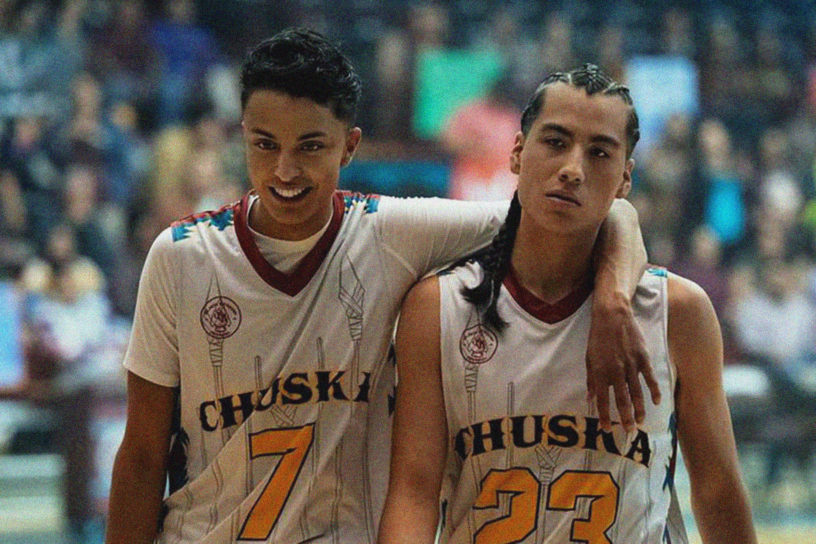By Daniel Opasinis
I had the pleasure of seeing Rez Ball, an Indigenous Netflix Original movie featured at the 2024 Toronto International Film Festival (TIFF).
Directed by Sydney Freeland, the film follows the Chuska Warriors, a Navajo high school basketball team on their journey to the state championship.
The tradition and spirit of Navajo peoples are celebrated but darker themes such as alcoholism and suicide in Indigenous communities were also explored diligently. Overall, the film was a beautiful tale of Indigeneity, resilience and teamwork.
I should mention that I myself am First Nations Mi’kmaq. My family comes from Eel River Bar First Nation, although I grew up quite the city boy. While the culture of my ancestors isn’t quite the same as the Navajo characters in this story, I love seeing similarities between teachings and traditions.
I like to think of tradition like a pie. Our crusts are all the same—a medicine wheel and maybe a sick drum beat—but each nation has its own taste of life. That taste is what makes intertribal connection so special.
“Rez Ball has me thinking a lot about native culture and the importance of identity”
Rez Ball isn’t just the name of the movie, it’s the name of the game. The Chuska Warriors play a local style of basketball where the aim is to play fast, allowing little time for stalling or setup. As soon as they get possession of the ball, they’re going for a shot. The Warriors use a lightning quick playstyle to stump teams as they climb the ranks of New Mexico’s high school basketball league.
Nataanii Jackson, played by Kusem Goodwind, is the team’s star player. As an audience, we follow Jackson’s struggle with loss and his eventual succession by his teammate and best friend Jimmy Holiday, played by Kauchani Bratt. I have yet to see a cast so representative of the Indigenous community depicted on screen. In a panel hosted by TIFF, Bratt explained to the audience that this was his first acting role ever.
I spent my time in the theatre with a smile across my face. The play-by-play scenes were thrilling, the Navajo language was well-incorporated in dialogue and the humour was impressively relevant.
Rez Ball is a film that can be enjoyed by anyone. The inside jokes will make every auntie slap their knee, but the story is something anyone could connect to. This universality was something I struggled with in the theatre. As much as I can appreciate the stories that connect us all together, sometimes I hope for an Indigenous depiction that not all viewers can relate to. The underdog to championship trope is well explored, but I’m sure there are many unique Indigenous triumphs that could be highlighted at events like TIFF.
Tradition plays a large part in the story of Rez Ball. After a tough loss against the Catholic Coyotes and the loss of a team member, the Warriors struggle to find their rhythm. Coach Heather Hobbs, played by Jessica Matten, calls on her childhood coach Benny to bring the team together through tradition. In the next scene, the camera follows a smudge bowl as it passes each member of the team. One by one, they sweep the smoke across their bodies as Benny gave a teaching about the old ways. I will say that although this scene was a stellar incorporation of traditional Indigenous ceremony, I wished there would have been more frequent appearances of these practices. Although impactful, it did feel like the “Hail Mary” reference that the film clung to.
The use of traditional drum songs to pump up the energy of action scenes was interesting and resourceful. It was easy to feel the spirit of the players through the screen as they worked towards scoring a point. The film also featured great works of hip-hop music that felt perfectly placed in the locker room.
“I like to think of tradition like a pie, our crusts are all the same but each nation has its own taste of life”
Accurate and intriguing portrayals of Indigenous culture don’t come out of nowhere. Universities need to take an active role in shaping education to include the knowledge and teachings of Indigenous people. This active participation across disciplines can fuel representation in creative industries. If programs like film and new media assess their impact on Indigenous stories, they could help inspire a future of accurate and respectful representation of Indigenous cultures.
Rez Ball has me thinking a lot about native culture and the importance of identity. What it means to be native isn’t exactly a clear question, and would require a much longer article to dissolve. I think there’s something special about leaving that question unanswered because whether it’s our communities, our teachings or our warm fry bread, the native identity is something that isn’t going anywhere.












Leave a Reply